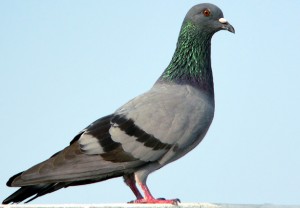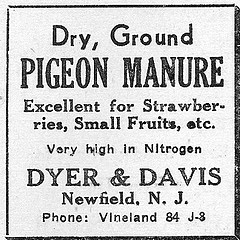
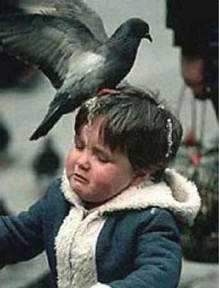 Everyone has had that wonderful moment when they drive their freshly waxed car out of the car wash only to have it soiled by the pigeon sitting on the telephone line just outside. And while we curse their name and shout empty threats they simply take flight with an air of accomplishment never to return again…until the next car wash of course. However, despite its negative reputation in major cities around the world, pigeon poop has had many beneficial uses for mankind throughout history. Pigeon poop, or guano, is extremely nitrogen rick making it an excellent source of fertilizer for early humans. (11) The use of pigeon guano as fertilizer continued throughout history up until the development of agribusiness that resulted in cheaper more efficient means of fertilizer’s.(11) In early history however, it is very plausible that the domestication of pigeons led to advances in the ability to grow the best possible crops. There is evidence that pigeon poop is a better means of fertilizer than other farm animal manure which could have led to the development of better agricultural societies than if pigeons had not been domesticated. (12) This point gains more force when the fact that pigeon poop was so valuable in history that armed guards were hired to protect the dovecotes from thieves is presented. (12) The importance of the discovery of pigeon poop as a fertilizer may have had great influence on the history of human agriculture. Additionally, pigeon poop contains a compound called saltpetre which is one of the three major ingredients in gunpowder. Saltpetre was extracted from the pigeon guano and mixed with charcoal and sulphur to make the gunpowder, a necessity in warfare after the advent of the gun. (13) Although there are other sources of saltpetre and it can be chemically synthesized today, pigeon guano would have been an important commodity in earlier history when these other sources were not as abundant or known. There is mention that in 16th century England, the pigeon was the only source of saltpetre which gives pigeons a huge role in the combative abilities of the English during this time period. (12) Perhaps pigeon poop was an important factor in the outcomes of some of the first wars involving guns, potentially changing the flow of history.
Everyone has had that wonderful moment when they drive their freshly waxed car out of the car wash only to have it soiled by the pigeon sitting on the telephone line just outside. And while we curse their name and shout empty threats they simply take flight with an air of accomplishment never to return again…until the next car wash of course. However, despite its negative reputation in major cities around the world, pigeon poop has had many beneficial uses for mankind throughout history. Pigeon poop, or guano, is extremely nitrogen rick making it an excellent source of fertilizer for early humans. (11) The use of pigeon guano as fertilizer continued throughout history up until the development of agribusiness that resulted in cheaper more efficient means of fertilizer’s.(11) In early history however, it is very plausible that the domestication of pigeons led to advances in the ability to grow the best possible crops. There is evidence that pigeon poop is a better means of fertilizer than other farm animal manure which could have led to the development of better agricultural societies than if pigeons had not been domesticated. (12) This point gains more force when the fact that pigeon poop was so valuable in history that armed guards were hired to protect the dovecotes from thieves is presented. (12) The importance of the discovery of pigeon poop as a fertilizer may have had great influence on the history of human agriculture. Additionally, pigeon poop contains a compound called saltpetre which is one of the three major ingredients in gunpowder. Saltpetre was extracted from the pigeon guano and mixed with charcoal and sulphur to make the gunpowder, a necessity in warfare after the advent of the gun. (13) Although there are other sources of saltpetre and it can be chemically synthesized today, pigeon guano would have been an important commodity in earlier history when these other sources were not as abundant or known. There is mention that in 16th century England, the pigeon was the only source of saltpetre which gives pigeons a huge role in the combative abilities of the English during this time period. (12) Perhaps pigeon poop was an important factor in the outcomes of some of the first wars involving guns, potentially changing the flow of history.
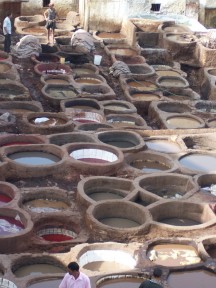
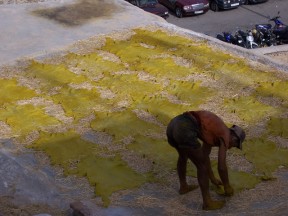
Another interesting and more modern use of pigeon poop can be found in Morocco. Here, the high levels of ammonia in their native species of pigeons’ droppings make them useful in the tanning of leather. During the tanning process, pigeon poop from wild pigeons is collected and used to help make the leather more supple than other leathers. (14) Although the smell of the process was described as being… unpleasant, small differences in leather quality can make all the difference to a potential buyer and the pigeon may be giving the Moroccans a leg up on their competition. It is truly amazing how pigeon poop, which most would agree has no positive elements associated with it, has had such great impacts on humans throughout history.
